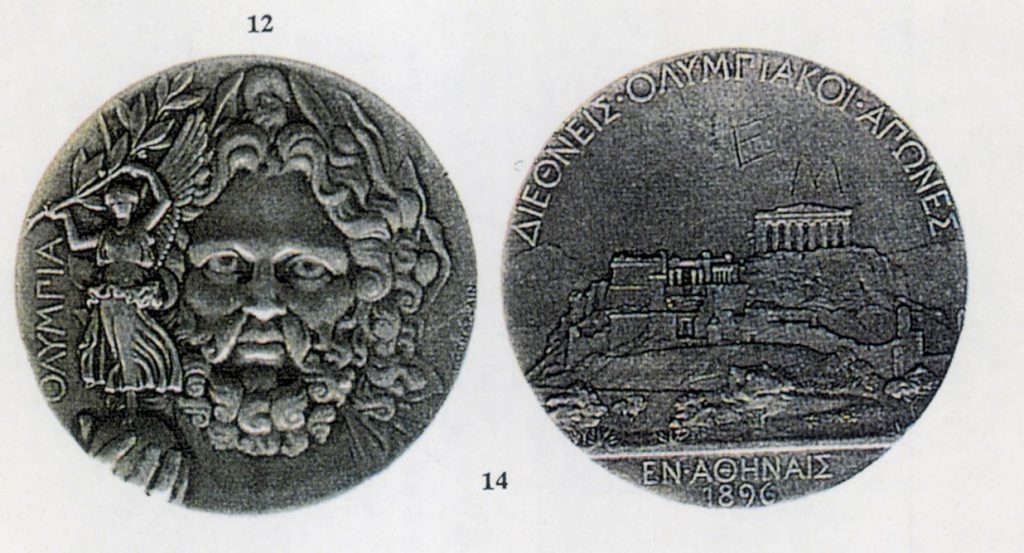And just like that, the game, or rather The Games, is afoot. The event of the year finally kicked off on Friday, and the whole world is ready to cheer on national champions for the next two weeks. And so, in keeping with the excitement surrounding the 2024 Paris Games, TO VIMA English Edition shares 24 facts many people may well not know about the Olympics.
- Chile participated in the first Summer Olympic Games
The South American country was one of just 14 countries to participate in the Athens 1896 Olympics, 11 of which were European. One athlete, Luis Subercaseaux claimed to have competed in the 100, 400 and 800 meters events.

- Women participated for the first time in the Paris 1900 Olympics
22 women competed at tennis, sailing, croquet, equestrianism and golf. A century later, the Sydney 2000 Olympics were the first to have women compete in every sport, while women from every country competed in the London 2012 Games.

Public domain via Wikimedia Commons
- The first modern medals were awarded in 1904
Until the St. Louis 1904 Games, first-place winners received a silver medal and an olive branch, while runners-up got a bronze medal and a laurel branch. No medal was awarded for third place. Gold medals were also made out of solid gold until 1912.

- Athletes from all five continents participated in the Stockholm 1912 Games
2,359 men and 47 women from 28 countries participated in 14 sports.
- The Olympic rings were designed in 1913
The founder of the modern Olympics, Baron Pierre de Coubertin, hand drew the interlocking colored rings in a letter to symbolize the five continents. The colors were chosen, because every nation’s flag contained at least one of them.

EPA PHOTO AFP/WILLIAM WEST/STF
- The Olympic flame was first lit in 1928
An employee from the Electric Utility of Amsterdam lit the first symbolic flame atop the Marathon Tower overlooking the Olympic Stadium during the 1928 Games. It wasn’t until the 1936 Berlin Games that the Olympic torch relay was introduced. Greek athlete Konstantinos Kondylis became history’s first Olympic torch bearer when he set off from Olympia, Greece.

- There are two flames within the torch
A smaller, hotter flame burns under the visible flame to rekindle it, should it go out. Back-up torches from Olympia are also kept close at hand to relight or replace any that burn out.
- The Olympics have been canceled three times
The first were cancelled in 1916 due to World War I, the others–in 1940 and 1944–due to World War II. The Tokyo 2020 Games, though not cancelled, were postponed due to the Covid-19 Pandemic.

- Seven Olympic athletes have died while competing in, or practicing at, Games venues
Two athletes have died while competing: the Portuguese runner Francisco Lázaro collapsed during the Stockholm 1912 Games, and Danish cyclist Knud Enemark Jensen died of heatstroke at the Rome 1960 Olympics. Five horses have also died as a result of injuries sustained while competing at the Games.
- Drug testing was introduced at the Mexico City 1968 Olympics
Swedish pentathlete Hans-Gunnar Liljenwall was the first athlete to be disqualified after his urine sample tested positive for excessive alcohol; he was stripped of his bronze medal.
- The Winter and Summer Games were held in the same year until 1992
The International Olympic Committee (IOC) decided to stage Games every two years, due to growing concerns over increasing costs and logistical complications. The last Summer and Winter Games held in the same year were in Barcelona, Spain and Albertville, France, respectively.
- The Atlanta 1996 Games were the most highly attended Olympics
A total of 8.3 million tickets were sold for what are commonly referred to as the “Centennial Olympics”.
- The 2008 Beijing Olympics had the most medals stripped for doping violations
A total of 50 medals were stripped from athletes, with Russia leading the way with 14 medals forfeited.
- Host states are selected seven years in advance
Members of the IOC elect a host city by majority vote in a secret ballot. Members cannot vote for their own country.
- The Summer Games have been hosted by 19 different countries
Athens, Tokyo and Los Angeles have hosted the games twice, while London and Paris have both hosted the Olympics three times.
- Ten countries have been banned from the Olympics down the years
Germany, Austria, Hungary, Bulgaria and Turkey were banned from the Antwerp 1920 Games and Germany and Japan from the London 1948 Games. South Africa was excluded 1964-1988, Rhodesia (Zimbabwe) 1968-1980, Afghanistan from the Syndey 2000 Olympics, and Russia from the Rio 2016 Games.
- Only five countries have participated in all 30 games
They are Australia, France, Great Britain, Greece and Switzerland.
- The US has won the most Olympic medals
American athletes have won a grand total of 2629 medals, followed by Russia with 1624 and Germany with 1386.
- More than 70 nations have never won an Olympic medal
Bangladesh is the most populous nation never to have won a medal.
- Six athletes have won metals in both the Summer and Winter Olympics
German athlete Christa Luding-Rothenburger is the only champion to have won medals at the Summer and Winter Games in the same year, winning silver in the track cycling sprint competition at the 1988 Seoul Summer Olympics and two medals in speed skating at the 1988 Calgary Winter Olympics.
- Michael Phelps is the most decorated Olympian
The American swimming champion won 28 medals, including 23 golds, between 2004 and 2016.
- The longest held Olympic record is 56 years old
The world record the American long jumper Bob Beamon set at the 1968 Summer Olympics, at which he jumped a staggering 8.90-meters, still stands today
23.Ian Millar holds the record for the most Olympic participations
The Canadian equestrian athlete has participated in 10 Games, breaking the record at the London 2012 Olympics.
24. Greece holds the record for the youngest Olympian in the modern Games
Greek gymnast Dimitrios Loundras was just 10 years old when he won bronze in the team parallel bars event at the Athens 1896 Games.














